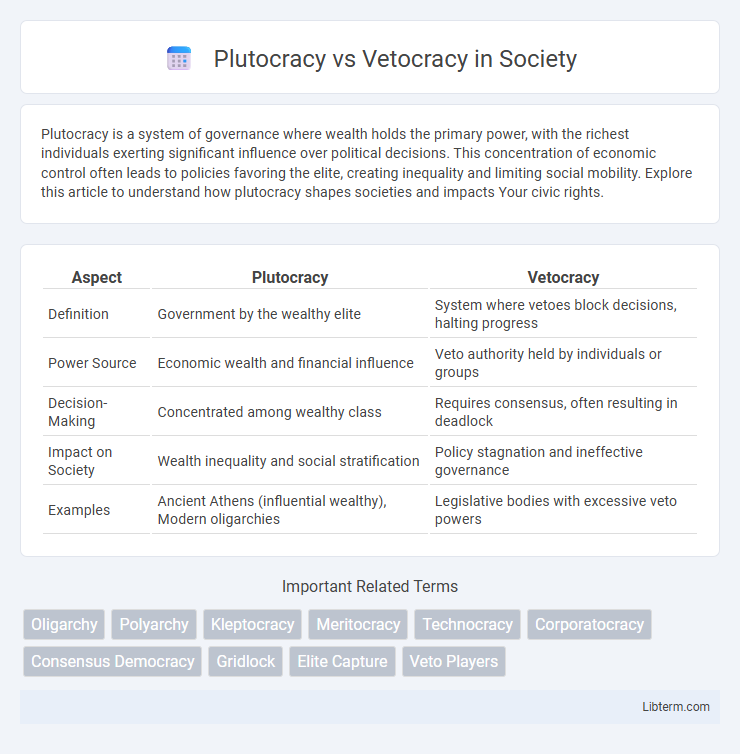Plutocracy is a system of governance where wealth holds the primary power, with the richest individuals exerting significant influence over political decisions. This concentration of economic control often leads to policies favoring the elite, creating inequality and limiting social mobility. Explore this article to understand how plutocracy shapes societies and impacts Your civic rights.
Table of Comparison
| Aspect | Plutocracy | Vetocracy |
|---|---|---|
| Definition | Government by the wealthy elite | System where vetoes block decisions, halting progress |
| Power Source | Economic wealth and financial influence | Veto authority held by individuals or groups |
| Decision-Making | Concentrated among wealthy class | Requires consensus, often resulting in deadlock |
| Impact on Society | Wealth inequality and social stratification | Policy stagnation and ineffective governance |
| Examples | Ancient Athens (influential wealthy), Modern oligarchies | Legislative bodies with excessive veto powers |
Understanding Plutocracy: Rule of the Wealthy
Plutocracy centers on governance by the wealthiest individuals, where economic power directly translates into political influence and decision-making authority. This system often leads to policies favoring the interests of the rich, exacerbating income inequality and limiting social mobility. Understanding plutocracy reveals how concentrated wealth shapes legislation, regulatory frameworks, and democratic processes, potentially undermining broader societal welfare.
Defining Vetocracy: Power Through Obstruction
Vetocracy is a system where power is held by the ability to veto or block decisions, creating governance through persistent obstruction. Unlike plutocracy, which concentrates power based on wealth, vetocracy disperses authority by enabling individuals or groups to delay or prevent policy changes. This creates a gridlock environment where progress stalls, and consensus becomes difficult to achieve.
Historical Evolution of Plutocracy and Vetocracy
Plutocracy, historically rooted in ancient city-states like Athens and Rome, evolved as wealth concentrated power in the hands of affluent elites who controlled political and economic decisions. Vetocracy emerged as a counterbalance system within democratic frameworks, designed to prevent tyranny by allowing multiple actors to block decisions, often leading to political stalemates. The historical evolution of these governance forms reflects ongoing tensions between concentrated wealth-driven authority and decentralized veto powers aimed at safeguarding broader participation.
Key Characteristics of Plutocratic Systems
Plutocratic systems are characterized by concentrated wealth influencing political power, where economic elites control policymaking to protect their financial interests. Decision-making processes prioritize the preferences of wealthy individuals and corporations, often limiting broader public participation. This concentration of power leads to social inequality and reduced political accountability in governance structures.
Vetocracy in Modern Governance
Vetocracy, characterized by a system where multiple actors hold veto power, often impedes decision-making processes in modern governance by enabling gridlock and protecting entrenched interests. This contrasts with plutocracy, where wealth concentration drives political control, whereas vetocracy disperses authority to prevent unilateral action but can stifle progress. Modern democracies face challenges in balancing vetocratic mechanisms to ensure accountability without paralyzing policy innovation and reform.
Economic Outcomes: Plutocracy vs Vetocracy
Plutocracy concentrates economic power in the hands of wealthy elites, often resulting in policies that favor capital accumulation, income inequality, and reduced social mobility. Vetocracy, characterized by widespread veto power among competing groups, tends to cause policy gridlock that stalls economic reforms and inhibits effective wealth redistribution. While plutocracy accelerates capital concentration, vetocracy often leads to economic stagnation due to conflicting interests preventing decisive action.
Political Stability and Instability: A Comparative Analysis
Plutocracy concentrates power in the hands of wealthy elites, often leading to political instability as economic inequality fuels social unrest and erodes democratic institutions. Vetocracy causes governance paralysis by enabling multiple veto players to block policy decisions, resulting in stagnation and unstable government performance. Comparative analysis reveals plutocracy destabilizes through socioeconomic divides, while vetocracy disrupts through procedural gridlock, both undermining political stability but via distinct mechanisms.
Impact on Democratic Institutions
Plutocracy concentrates power in the hands of the wealthy elite, undermining democratic institutions by skewing policy decisions to favor financial interests over public welfare, eroding political equality and accountability. Vetocracy creates gridlock within democratic systems by enabling multiple actors to block policies, leading to institutional paralysis and diminished government effectiveness. Both pluto- and vetocracies weaken democratic legitimacy, compromising institutional capacity to respond to societal needs and threatening the core principles of representative governance.
Social Consequences of Both Systems
Plutocracy concentrates wealth and power in the hands of a rich elite, often resulting in increased social inequality, reduced social mobility, and limited access to essential services for lower-income groups. Vetocracy, characterized by excessive veto power among competing interests, can stall policy-making and perpetuate social divisions by preventing effective governance and addressing systemic issues. Both systems undermine social cohesion but do so through different mechanisms: plutocracy through economic exclusion and vetocracy through political gridlock.
Future Trends: Navigating Plutocracy and Vetocracy
Future trends indicate increasing challenges in governance as plutocracy concentrates wealth-driven power, while vetocracy amplifies veto power, leading to political stalemates. Emerging digital governance tools and decentralized decision-making platforms aim to balance influence, promoting transparency and broader participation. Innovations in AI-driven policy analysis and inclusive civic tech offer pathways to mitigate plutocratic dominance and vetocratic gridlock.
Plutocracy Infographic

 libterm.com
libterm.com